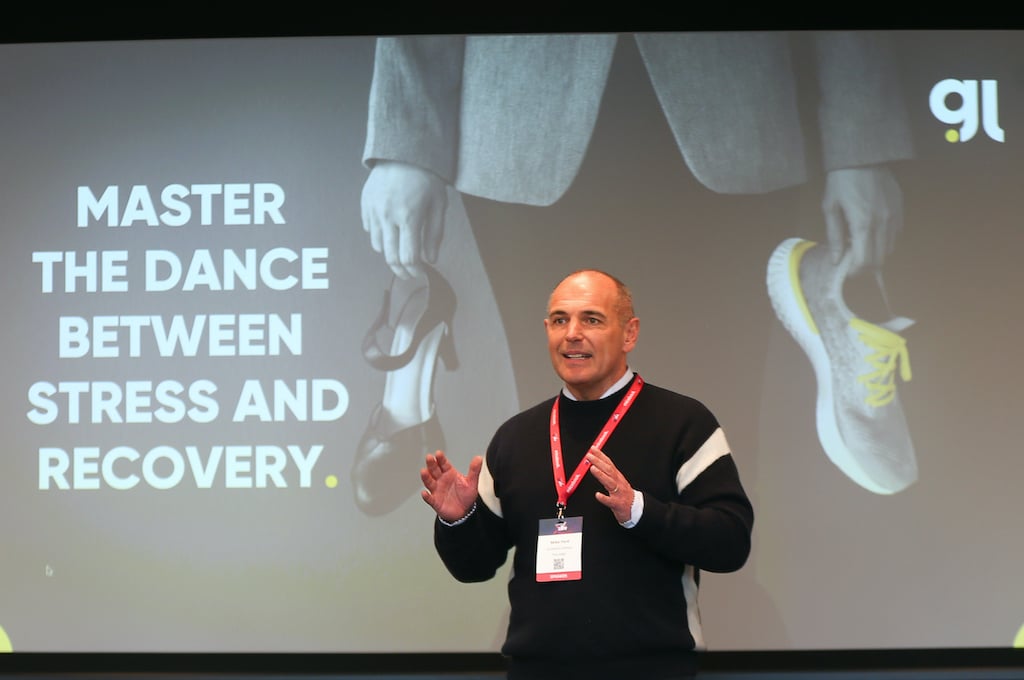With burnout and mental health issues a growing problem within our sector, and workplaces in general, we invited Mike Ford, who has more than 20 years’ experience working in the events industry and is now founder of Grateful Lemon, to speak at micebook EXPO last week.
Ford, who was board director at global agency Touch Associates before leaving to set up his own consultancy, ran a thought-provoking session on “the power of personal human energy” for our nineteen agency leaders’ group, as well as a workshop on work/life balance for our NextGen content series.
We caught up with him to find out more about the new business, and his passion for helping businesses improve the energy in their people, culture and workplace…
What’s the story behind Grateful Lemon?
I have always been intrigued by what makes someone a peak performer. At Touch, a lot of the work we did was all about creating behavioural change. I have also worked with many high achieving sports professionals including Paralympians, footballers and rugby players and my wife is really into health and fitness and is a life coach and nutritionist, so wellbeing is a big part of my life.
There is a workplace phenomenon happening, which was massively accelerated by Covid, and is resulting in a lot of people struggling in their daily lives – 7 in 10 people according to a Galllup poll. We are working and living in a permanently-on world, where you’ve got people working where they are living and living where they are working, everything has merged and the speed has life has got quicker. As a result, burnout and overload are now commonplace, and it’s the number one reason people leave their jobs. With so many people struggling, I felt I could use my experience to offer some solutions.
What’s different about your approach?
I spent a lot of time researching with authors, scientists, doctors and sports stars to make sure there is data and science behind what we do. What’s come to the light is this relationship that I call the dance between stress and recovery.
Most wellbeing initiatives mainly focus on how to reduce stress. Our approach is the dance between stress and recovery because when anyone has ever been at their peak, there is stress involved. You must have a certain level of stress because stress drives cortisol, adrenalin, and all the things you need to perform at your best. If you look at the best sports stars, they are unapologetic about taking the time they need to recover. But in the corporate world, we spend zero time celebrating and acknowledging recovery.
Our focus is on helping people understand and master that dance or relationship between stress and recovery, what they can do on a personal level to help them recover, as well as some of the things they can do to reduce stress. It’s all about the individual and getting them excited about and believing they can make changes.
It’s all very well having the knowledge, but knowledge isn’t power, action is power. To make change, people need to understand why change happens and how to make change. Why do 91% of new year’s resolutions fail? It’s because people focus on the goal, they don’t focus on the habits. It’s about understanding the habit loop and how to change habits. It’s about making small incremental changes and being consistent. There are lots of different tactics and we focus on about 30 different things to create healthy habits, with sleep being a core focus.
What services do you provide?
We run workshops for teams to understand what they can do on an individual level to make change and improve their personal energy. We also work with leadership teams to help them understand how they can support this as an organisation and create a culture that celebrates recovery.
The leaders set the culture, and it doesn’t matter what words you’ve got written down as your values, it’s what you do and how you behave as leaders that matters, for example are you contradicting it by sending emails in the middle of the night? It’s all well and good the individual doing it but if leaders don’t embrace it, support it, and encourage it, then you are going to have this conflict.
What type of companies are you working with, and how have they benefitted?
We’ve worked with companies in various industries including recruitment and law. One of our clients, a big recruitment company, said this: “The biggest single injection of personal collective positivity on our work culture and wellbeing has come from this. Conversations, laughter, smiles, light-hearted competition and most importantly comradery and support have come from your sessions with our teams.”
What advice would you give to event industry leaders?
I have been one of those leaders that encouraged people to work late and pushed the hustle culture. But there is no longevity to that. I have been there, seen it, done it, and suffered myself, and I don’t want others to suffer. I want people to find a new way, without just running away from stress. Embrace the dance between stress and recovery, and then implement some new habits, not just personally but collectively.

